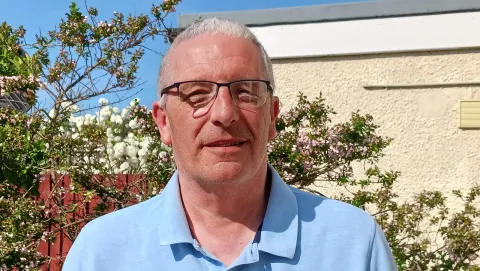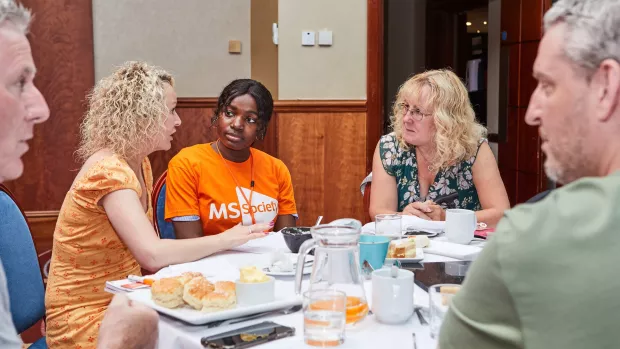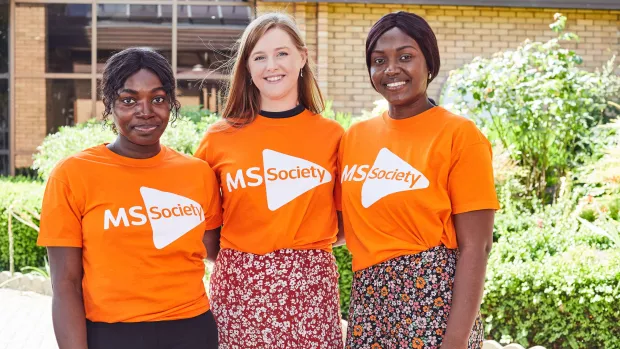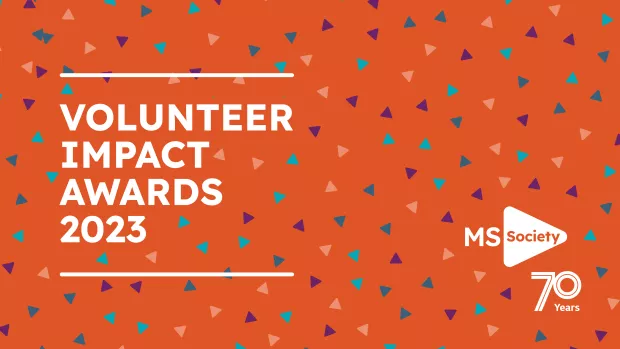
Looking on the bright side
Steve tells us how his MS hasn’t stopped him and why he always looks for the positives in life.
I was diagnosed with primary progressive MS in October 2014. Like many people, it took a while for the diagnosis to be confirmed. I was having a lot of symptoms of MS, but I didn't know what it was. My main symptom was fatigue. There were changes to my body as well. For instance, I noticed when I was walking down the stairs that my left foot was flicking out to the side.
I feel lucky to have been diagnosed with MS
I spent four days in hospital having various tests. I was lucky I had a pretty positive experience whilst I was there. The staff were brilliant, and I was in a room with four great guys. One of which became a very good friend of mine. His name was Colin.
We both had the same tests, but he was diagnosed with motor neurone disease. I was with him, alongside his amazing family, when he sadly died two years later. Losing Colin made me realise that it could have been me. So, I actually feel very lucky to have been diagnosed with MS instead.
Challenging myself helps me stay positive
I’m a ‘glass half full’ kind of guy. Once the initial shock of being diagnosed with MS had worn off, I threw myself into every therapy I could. I’m a regular at the MS Action Centre in Walthamstow, which provides complementary therapies for people with a range of conditions. Therapies include oxygen therapy, physiotherapy, reiki, shiatsu etc.
I do 8 kilometres uphill on an exercise bike every day to keep my legs moving. I do 50 arm exercises daily to maintain my upper strength in case I ever fall, which was something I was conscious about. I’ve learnt so much about various treatments, therapies and exercises, it’s helped me maintain my confidence.
Having MS means you have to adapt but I still like to challenge myself. Two years ago, I did the memory walk in honour of my brother-in-law who passed away from dementia. As I have problems with walking, it took me an hour and 48 minutes to walk two kilometres.
By the time I’d finished they’d started taking down the banners and signs, which I couldn’t help but laugh about. I’m proud to say I came last! I crossed the finish line and that’s what it’s all about. Sometimes you need to be able to laugh at the situations you find yourself in because you can’t always change them.
Realising my calling as a volunteer
I started volunteering for the MS Society as a Befriending Volunteer five years ago. There was a particular occasion that made me realise I wanted to help and support others with MS.
I went to see my consultant and there was a young lady sitting opposite me. I would say she was mid to late 20s, maybe early 30s. She was called to go in before me. I thought she’d been in there for a while, and I guessed she was being told she had MS. When she came out, she was in pieces. They almost had to carry her to her chair — she obviously had just been diagnosed. Seeing the situation unfold is what triggered me to become a volunteer.
As a Befriending Volunteer, I’m matched with someone living with MS for a weekly phone call which lasts an hour. At the moment, I’m speaking with two people. The aim of the befriending service is to help combat isolation and loneliness. We talk about all sorts - treatments, what we’re watching on TV, music, family and friends. I've spoken to some amazing people.
One lady I was matched with had a couple of portraits in the National Portrait Gallery. Another guy I spoke to was a bagpipe player at Harrods. One lady I became close with drives for the British disabled racing team. I’m so proud of her and the challenges she’s overcome to be where she is now.
Money isn’t important, helping people is
I love talking to people. I love sharing experiences and listening to other people’s stories. It benefits me personally when I can give something back. When you’re working it can be easy to become money orientated. It was when I was diagnosed with MS that I realised money isn’t important, helping people is. And if I can be remembered for anything, it will be that.
But the people who use the service also get a lot from it. My greatest achievement was a person who gave feedback which simply said, "After our 12 week, one-hour sessions I have learned to smile and laugh again. Thank you".
The biggest piece of advice I could give someone in this kind of role is to listen to what's not being said. Listen out for someone’s pauses which may indicate something’s wrong and try to gently bring these concerns out. Don't be afraid to say, “Hang on, is there something that's bothering you?”.
Volunteering will make you feel great!
To anyone thinking of becoming a Befriending Volunteer, I’d say just do it! Don’t think about it too much — it’s just an hour of your time. That’s only two episodes of EastEnders a week! Not only will you feel great, but you’ll also be helping someone else in the process.



